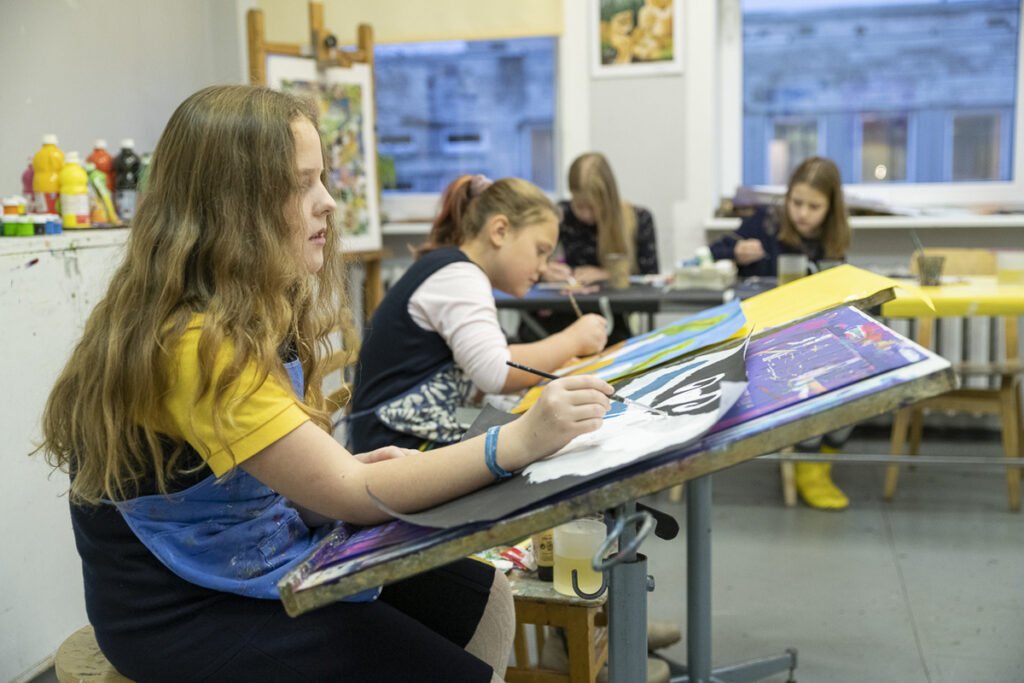Distance learning clearly showed that almost a third of students are not yet able to study independently enough. The Estonian start-up Clanbeat is one of the first to focus entirely on supporting the development of a self-directed learner.
With Clanbeat, students will get used to aiming, planning, and also reflecting on their own learning. The application also supports students’ social and emotional development by providing opportunities to monitor their well-being. The role of the teacher, who consistently supports the students in developing these habits, is very important.
Good sleep, good learning
“As one of the first things the students started using the app for was to record how they slept and what their mood was like,” says Triin Noorkõiv, a member of the Clanbeat team. “However, when we have not had a good night’s sleep and are in a grumpy mood, it is very difficult for us to organize our own learning. So, it makes sense to learn to notice and plan time for sleep. In addition to sleep, the students’ relationships with peers, teachers, other adults and the mood the student is in are important. Clanbeat also offers students an easy way to monitor this.”
See also:
In Estonia, both the state and private companies provide nfosystems to support school life
“As it is important for young people to be able to monitor and analyze their situation and activities together with an adult, the class teacher, and if agreed, the school support specialist will get an overview of the students’ mood assessments. Clanbeat provides the class teacher with invaluable information. The teacher sees real-time data on how their students are sleeping, how they are communicating, what kind of feeling they start the day or week with, and how they summarize the day or week.
Based on this information, the class teacher decides with whom they need to communicate more closely in order to prevent any problems from expanding. To save time and give feedback quickly to the class teacher, the Clanbeat app itself gives the student who has negative emotions the advice and initial supportive words and thoughts – the program is interactive.”
How can a student tell what mood they are in?
“The student does not have to describe their mood at length but can choose from predetermined emotions that we have developed in collaboration with educational psychologists. This is a good opportunity for the student to get to know the vocabulary of emotions and to get to know their mood and feelings better.
The daily or weekly welfare questions have four multiple-choice responses. If you want to give a positive answer, you will choose a smiling emoticon; if not, you will choose the sad one. One question is whether the student was able to laugh with others. This is, in our view, one of the most important issues at the moment.
Pupils’ assessments of well-being are aggregated for the teacher as a review of the class. This way, they see the state of the class as a whole and can look at each student’s answers individually. Those who give a negative answer can be contacted promptly by the teacher to find out what is causing the concern.
Answers cannot be given in retrospect or in advance at Clanbeat. Questions asked in the morning can be answered within a few hours. The unanswered questions will be skipped this time and will soon be replaced by evening questions.”
Do students have to fill in Excel every day?
“Fortunately, not! In the case of well-being questions, a question message appears on the smartphone screen. When the student clicks it open, they see a question and multiple-choice answers. It only takes a few seconds to choose the emoticon that suits the student’s mood. For other activities, the student can also add an emoticon corresponding to their emotion in Clanbeat, which is also a matter of a few clicks. We’ve been pleased to see from the data that many of our users have embraced recording their feelings in this way.”
What happens when a student presses an emoticon with a sour face?
“Then flags appear in the application for the teacher. They point at the students with whom there is reason to talk. The teacher can detect a worried child thanks to these flags as soon as the young person has reported his/her negative state and the teacher opens a corresponding overview in the application. Immediately after giving negative answers to the well-being questions, the Clanbeat application itself responds to the student. An image of a friendly llama appears on his/her phone or computer screen, saying words of support to him/her.
When a young man chooses a slightly sad emoticon one day, the llama comforts him/her that we all have better and worse days. However, if a very negative answer is chosen, and several times in a row, the llama student suggests finding an adult with whom to share his/her concerns. In collaboration with the NPO peaasi.ee, which unites mental health specialists, references to supporting materials have also been added to the application.
For a young person, this is just the primary feedback. If it is of any use, wonderful, but it is important for him/her to be able to talk about his/her concerns with a trusted adult. The idea of using a llama is that the student would not stay waiting for help but would learn to notice his/her needs and be able to find and ask for help himself/herself. The child must feel that they can do something to solve the problem, that they are the masters of their life. Figuratively speaking, we in Clanbeat want to give the child a fishing rod, not a fish.”
See also:
What are Estonian schools doing differently during the second wave?
“But we also really need to support teachers. The risk of burnout is high, and we all want students to be taught by teachers with good mental health. With Clanbeat, we also want to help strengthen teachers’ self-management muscles: they also have the opportunity to respond to well-being questions at Clanbeat.
The topic of self-directed learner and supporting the well-being of learners has become very important during distance learning. In the case of students, we have learned that many of them would not have thought about themselves in this way without the application. We want our children and young people to be willing and able to monitor their mental health and act on their needs and interests, but also to be able to support their peers. We want teachers to get the necessary information about their students quickly and easily because then they can better support them as then they are able to notice risk areas and intervene before the problems get worse.
Teachers’ views
Maarja Seemen, psychologist and class teacher
We had a very special experience with Clanbeat. There was one student whom the teachers considered superficial. However, watching his reflections in the Clanbeat application, I realized that things are not as they seem. It moved me a lot that he cared to dig deeper, to write, to share his thoughts with me as a teacher. It was a wonderful recognition I wouldn’t have received without Clanbeat. It was also very special how the class started to eagerly look at each other’s profiles, dreams, and interests, looking for common ground. It increases the sense of unity and gives the teacher information about the students. As a psychologist, I find Clanbeat’s well-being part very valuable. When students respond to questions, it is a great tool for monitoring and keeping an eye on the state of the class.Kaisa Tamkivi, class teacher
Clanbeat has led me to think more consciously about the role of the teacher and to experiment with different ways to develop students’ general skills. At school, we chose an approach with management and teachers where students themselves begin to write down their learning assignments in Clanbeat, and the teachers will no longer write them down. It has been exciting to see how students can be directed to take responsibility with Clanbeat’s support. At the same time, it is exciting to see how we increasingly learn to trust them; as teachers, we let go of constant scrutiny and allow students to be wrong and make mistakes because we understand that people indeed learn from their mistakes.
Day-Lee Holm, class teacher
We started using Clanbeat during distance learning. My first wish was to help create a sense of team and unity in the class, which we missed a lot during the distance learning. I was also fascinated by an additional opportunity to practice monitoring my mood and well-being. The topics raised in Clanbeat in the well-being questions are completely new to many students: noticing oneself, thinking about oneself. Developing this habit is important.
Students’ views
Katariina Lahe, 7th-grade student
At our school, at the end of each week, we make a summary, which we share with the class teacher. We give feedback on how things have gone, what important events have taken place. Answering well-being questions is already a daily habit for me. It is very practical and helps me to get an overview, and I hope that the teachers will also get an overview. These questions have made us feel that we are cared for.
Melanie Riik, 9th grade student
It’s nice to share my impressions with others. I can talk to my class teacher and classmates – it brings the whole class closer together. Thanks to Clanbeat, I have started to notice that there has been joy every day.
Regina Reinomägi, 7th-grade student
Clanbeat is an e-diary for me where I can write my things down. Sometimes I also answer well-being questions. When we started using Clanbeat, it was very exciting to look at the interests and dreams of all our classmates and what we have in common. There were very cool things: for example, the dream of finding the love of your life. It also turned out that many people like the same movie genre. In Clanbeat, it is easy to communicate with both the teacher and other students, send notices and messages.
The full version of the article by Raivo Juurak first published in Õpetajate Leht







